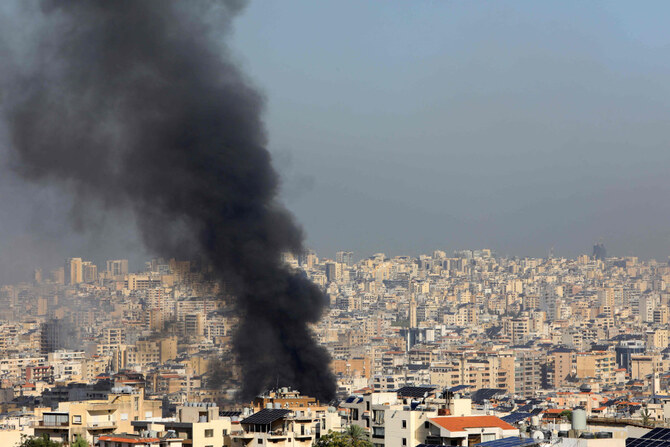LONDON: How does one write a feature looking through Lebanon’s year without it sounding like an obituary?
Across Lebanon and wherever in the world citizens found themselves on Oct. 7 last year, phones buzzed and lit up with notifications of the seemingly unbelievable news.
Hamas, the insurgent militant group that had been running the Palestinian enclave of Gaza since 2007, had launched a surprise attack on Israel.
At first, near disbelief. Could it possibly be true?
Israel had long boasted about the impregnable nature of its “Iron Wall,” the high-tech, 7-meter-tall fence surrounding Gaza.
Bristling with cameras, watch towers, robotic machine guns, razor wire, radar and underground sensors, it was designed precisely to prevent exactly such an incursion.
Yet with every fresh ping, with every update flashing on smartphones, the unthinkable became increasingly possible, then probable and, finally, certain.
Hamas, relying on a combination of brute force and ingenuity — bulldozers smashed through the fence and drones dropped explosives on watch towers, knocking out the remotely operated machine guns — had broken through the Iron Wall in as many as 30 places.
More than 1,200 Israelis and others were killed, and 251 taken back to Gaza as hostages.
Hearts sank. All Lebanese knew full well that Lebanon was never not going to get involved, whether its citizens wanted to or not.
Past is prologue, and Lebanon’s history is riddled with sudden yanks into conflicts in which it has no business being involved.
From Israel’s 1982 invasion of Lebanon, in response to Palestinian militants using the country’s south as a launching pad for missiles and attacks, to the 2006 war between Iran-backed group Hezbollah and Israel, Lebanese citizens have always found themselves caught in the crossfire.
Their dead, wounded, ruined homes and countless devastated lives are written off by all sides as collateral damage.
Now, one year on since the start of Hamas’ assault on Israel and the latter’s devastating response in Gaza — which has claimed in excess of 40,000 Palestinian lives, including more than 6,000 women and 11,000 children — once again Lebanon is being sucked into someone else’s catastrophe.
It all seemed depressingly inevitable from the outset, when the day after the Hamas attack its ally Hezbollah began exchanging fire with Israel over Lebanon’s southern border.
Since then, Lebanon has suffered immense damage, especially in its southern villages and towns, which have been repeatedly and indiscriminately pounded by Israeli jets targeting Hezbollah outposts.
Nearly 1 million Lebanese have been displaced internally, 1,974 have been killed including 127 children, and 9,384 wounded, according to the Lebanese health ministry.
The situation began to deteriorate alarmingly on Sept. 17, when thousands of Hezbollah pagers, sabotaged by Israeli agents, exploded simultaneously across Lebanon, killing a dozen people, including two children, and wounding thousands more.
The following day similarly sabotaged walkie-talkies detonated. This time 30 people died and hundreds more were injured. Now Israeli troops have invaded the south of Lebanon.
Lebanon has been in a spiral since 2019, when it was rocked by a disastrous and ongoing financial crisis that has seen the lira drastically devalued.
Since then further blows have included the COVID-19 pandemic, which struck Lebanon in early 2020, and the devastating Beirut Port explosion later that year that rocked the capital and destroyed thousands of structures.
To make matters worse, political paralysis has left Lebanon without a president or an effective government for the past two years.
In a statement issued on Oct. 31, 2023, the first anniversary of Lebanon’s presidential vacancy, the US State Department accused the country’s “divided parliamentarians” of “putting their personal ambitions ahead of the interests of their country.”
Issued just over three weeks after the Hamas attack on Israel, the statement added presciently: “Even as rising tensions along Lebanon’s southern border threaten the country’s stability and the economic crisis deepens, the Lebanese people are deprived of leadership when they need it most.”
Around the world, since Oct. 7, Lebanese have been glued to their screens, holding their breath with each missile fired across the border in either direction.
And listening with growing anxiety to the pronouncements of Israeli Prime Minister Benjamin Netanyahu and the fiery speeches of Hezbollah leader Hassan Nasrallah.
Nasrallah’s death in an Israeli air strike on Beirut on Sept. 27 killed at least five other people and injured dozens more.
For the Lebanese in Lebanon and abroad, every day begins with a recap of the destruction and a counting of the dead, injured and missing. Every day ends with evacuation drills across areas of the capital targeted by Israeli bombs and missiles.
Today, as before, they are helpless bystanders, witnesses to the destruction of their country and the loss of the lives of their friends and family members.
As Michael Young of the Malcom H. Kerr Carnegie Middle East Center wrote late last month, “the opening of a front in the south on Oct. 8, 2023, was the final straw. Hezbollah consulted none of its Lebanese partners in initiating a war in defense of its ally Hamas in Gaza.”
Hezbollah, he added, “displayed remarkable hubris in being completely indifferent to the fact that Lebanon paid a heavy price in the past for the Palestinian cause — especially the Shia community itself.
“After hubris comes nemesis, however, and today Hezbollah is largely alone in facing the violent Israeli campaign against Lebanon.”
Perhaps. But for now, the war has seen Lebanon’s sectarian noose grow ever tighter.
Social media has become a parallel battleground, for the preaching of one side against the other, pitting blame based on religiosity and correlating silence with acquiescence.
The Lebanese have always reluctantly accepted that, in Lebanon, this is just the way things are.
It remains to be seen whether, in the wake of the current disaster engulfing the country, the Lebanese will finally abandon their passive acceptance of a cruel fate dictated by others.



























